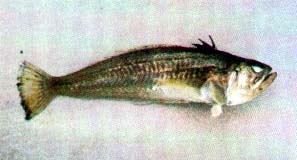 Weever Fish Weever Fish
This fish, commonly found around Britain's coasts
lies buried in sand close to the shoreline, so is easily trodden
on. Venomous spines on its gill covers and dorsal fin
puncture the skin causing an extremely painful local reaction.
What to do if stung
To inactivate the venom put the injured part in water as hot
as you can bear for at least 30 minutes. Top up the water as it
cools, being careful not to scald. The Knoll Beach visitor
centre provide hot water for this purpose and are used to
treating casualties.
It should not be necessary to go to hospital
unless spines are clearly visible in the wound. Provided hot
water treatment is applied quickly, the pain wears off within 30-45
minutes and there should be no lasting effects.
Editor's note: Weever and similar fish are common around the
coast of France and Northern Spain where local folklore
recommends urinating on the sting. If you can't get hot water it
may be worth a try. Another treatment some say is effective is
vinegar. We have no first hand reports or experience of these
methods, let us know if you do! |